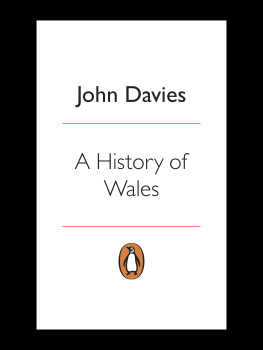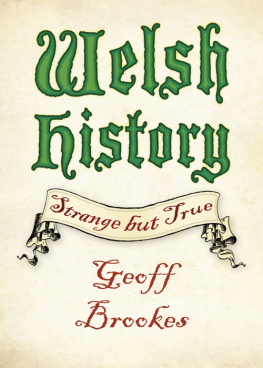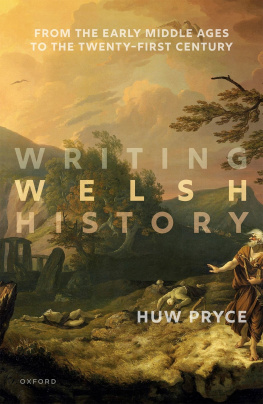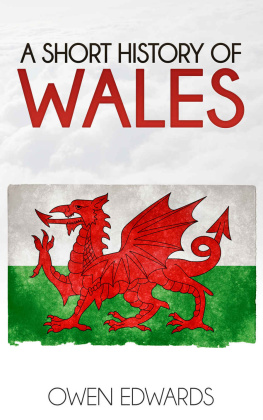John Davies - A History of Wales
Here you can read online John Davies - A History of Wales full text of the book (entire story) in english for free. Download pdf and epub, get meaning, cover and reviews about this ebook. year: 1994, publisher: Penguin Books, genre: History. Description of the work, (preface) as well as reviews are available. Best literature library LitArk.com created for fans of good reading and offers a wide selection of genres:
Romance novel
Science fiction
Adventure
Detective
Science
History
Home and family
Prose
Art
Politics
Computer
Non-fiction
Religion
Business
Children
Humor
Choose a favorite category and find really read worthwhile books. Enjoy immersion in the world of imagination, feel the emotions of the characters or learn something new for yourself, make an fascinating discovery.
- Book:A History of Wales
- Author:
- Publisher:Penguin Books
- Genre:
- Year:1994
- Rating:4 / 5
- Favourites:Add to favourites
- Your mark:
- 80
- 1
- 2
- 3
- 4
- 5
A History of Wales: summary, description and annotation
We offer to read an annotation, description, summary or preface (depends on what the author of the book "A History of Wales" wrote himself). If you haven't found the necessary information about the book — write in the comments, we will try to find it.
John Davies: author's other books
Who wrote A History of Wales? Find out the surname, the name of the author of the book and a list of all author's works by series.
A History of Wales — read online for free the complete book (whole text) full work
Below is the text of the book, divided by pages. System saving the place of the last page read, allows you to conveniently read the book "A History of Wales" online for free, without having to search again every time where you left off. Put a bookmark, and you can go to the page where you finished reading at any time.
Font size:
Interval:
Bookmark:
PENGUIN BOOKS
A History of Wales
John Davies is a native of the Rhondda. He was educated in schools in Treorci, Bwlchllan and Tregaron, and at University College, Cardiff, and Trinity College, Cambridge. He taught at the university colleges of Swansea and Aberystwyth and was for eighteen years the Warden of Neuadd Pantycelyn, Aberystwyth. His other publications include Cardiff and the Marquesses of Bute, Broadcasting and the BBC in Wales, The Making of Wales, The Celts, and Cardiff: A Pocket Guide. He is the consultant editor of The Encyclopedia of Wales. His wife comes from Blaenau Gwent and they have two daughters and two sons.
JOHN DAVIES
REVISED EDITION

PENGUIN BOOKS
PENGUIN BOOKS
Published by the Penguin Group
Penguin Books Ltd, 80 Strand, London WC2R 0RL, England
Penguin Group (USA) Inc., 375 Hudson Street, New York, New York 10014, USA
Penguin Group (Canada), 90 Eglinton Avenue East, Suite 700, Toronto, Ontario, Canada M4P 2Y3 (a division of Pearson Penguin Canada Inc.)
Penguin Ireland, 25 St Stephens Green, Dublin 2, Ireland (a division of Penguin Books Ltd)
Penguin Group (Australia), 250 Camberwell Road, Camberwell, Victoria 3124, Australia (a division of Pearson Australia Group Pty Ltd)
Penguin Books India Pvt Ltd, 11 Community Centre, Panchsheel Park, New Delhi 110 017, India
Penguin Group (NZ), cnr Airborne and Rosedale Roads, Albany, Auckland 1310, New Zealand (a division of Pearson New Zealand Ltd)
Penguin Books (South Africa) (Pty) Ltd, 24 Sturdee Avenue, Rosebank, Johannesburg 2196, South Africa
Penguin Books Ltd, Registered Offices: 80 Strand, London WC2R 0RL, England
www.penguin.com
First published in Welsh, under the title Hanes Cymm, by Allen Lane 1990
First published in English by Allen Lane 1993
First published in Penguin Books 1994
Revised edition published 2007
Copyright John Davies, 1990, 1993, 2007
All rights reserved
The moral right of the author has been asserted
ISBN: 978-0-14-192633-9
For Anne and in memory of Phill
The original edition of this book brought the story up to the late 1980s. Since then, the people of Wales have experienced remarkable changes, social, economic and constitutional in particular, the establishment of the National Assembly of Wales in 1999. While this book was in the press, the Wales Act (2006) was passed; as the Act gives the Assembly quasi-legislative powers, it is further evidence that devolution is a process rather than an event.
This edition contains an additional chapter which seeks to assess developments in Wales over the last quarter of a century and more. Apart from some slight corrections and revisions, the rest of the text is essentially that published in 1993.
In preparing this edition, I have accrued further debts. Richard Duguid at Penguin, whose father contributed so greatly to the original edition, has been both incisive and patient, and I am also grateful for the assistance of Simon Winder, Chloe Campbell and Rebecca Lee. Once again, my chief debt is to my wife, Janet Mackenzie Davies, who prepared the index and who scrutinized every paragraph. I concluded the introduction to the 1993 edition by expressing my belief that it is more stimulating to be a member of the Welsh nation in the last decade of the twentieth century than it has ever been before. In the first decade of the twenty-first century, that stimulation is even more apparent.
John Davies,
Grangetown,
Cardiff
14 May 2006
As I was writing this book, I noted the sources of quotations, together with a vast number of references to books and articles, but it soon became apparent that the publication of the notes would double the size of the book.
Those who wish to read extensively in the field should consult Philip Henry Jones, A Bibliography of the History of Wales (third edition, microfiche, 1988). The Local Historian (volume 17, numbers 5 and 6) contains an article entitled What to read on the history of Wales, and there are lively notes on books and articles in Gwyn A. Williams, When Was Wales? (1988). So far, four volumes have appeared in the series on the history of Wales published jointly by the Clarendon Press and the University of Wales Press and there are valuable bibliographies in each one of them. See R. R. Davies, Conquest, Coexistence and Change, Wales, 10631415 (1986), Glanmor Williams, Recovery, Reorientation and Reformation, Wales, c. 14151642 (1987), Geraint H. Jenkins, The Foundations of Modern Wales, 16421760 (1987) and Kenneth O. Morgan, Rebirth of a Nation, Wales, 18801980 (1981). On the period before 1063, there are useful lists in H. N. Savoury and others, Ancient Monuments in Wales (1976), and in Wendy Davies, Wales in the Early Middle Ages (1982). For the earlier part of the period 17601880, there is a bibliographical essay by Gwyn A. Williams in David Smith (ed.), A People and a Proletariat (1980); for the later period see Ieuan Gwynedd Jones,Explorations and Explanations (1981). The Welsh History Review (22 volumes since 1960) publishes comprehensive reviews, summaries of articles and lists of unpublished theses. The entire book catalogue of National Library of Wales is available on the librarys website.
The Beginnings: Paviland, Tinkinswood and Llyn Cerrig Bach
Once upon a time, the Welsh knew when their history began. It began about 1170 BC .That was when the Ark of the Covenant was captured by the Philistines and when Brutus, a descendant of the Trojans, landed on the shores of Britain. Apart from a few giants, the island had no inhabitants. Brutus and his companions were the first of the Britons and the ancestors of the Welsh. This was Geoffrey of Monmouths account of the early history of Britain, written c. AD 1136, an account which would be central to the consciousness of the Welsh for many centuries.
Such precision about the beginnings of Wales and the Welsh has long ceased to be tenable. It is possible to suggest a number of dates as the starting-point of the history of Wales: it appears that Wales as a territory having a coast-line similar to that of today came into existence around 6000 BC ; Wales, or part of it, tiptoes into the historical record for the first time with Tacituss description of the Roman attack in AD 48 upon the Deceangli, a tribe living between the rivers Clwyd and Dee; the royal houses of Wales traced their origins to the generation before AD 400; it is likely that the name Cymry was adopted around AD 580; the territory of Wales was defined with some exactness about AD 790 with the building of Offas Dyke. There are valid arguments for beginning the story with any one of these dates. Yet it would be better to begin in the beginning with the earliest evidence of the presence of human beings in that part of the world which was eventually to be known as Wales. But what kind of evidence? If it is assumed that the task of the historian is to offer an interpretation of the past based upon written evidence, then the story must begin in AD 48. But if history is a study of the past based upon the widest possible variety of sources, then the story begins not two thousand but more than two hundred thousand years ago.
Although the techniques of the archaeologist are very different from those of the historian, both are involved in the same task that of analysing change and development in human society. To begin with history and to ignore prehistory is to lose sight of the basic fact that, when the people of Wales first appeared upon the stage of history, almost every development of importance had already taken place. That people could create and control fire, cook food, cultivate the land, rear stock, build dwellings, make metal, brew beer, theorize about the world to come, produce fine art, cure sickness, practise literature, maintain political structures and kill and oppress their fellow-creatures. That is, they had all the cultural, spiritual and social attributes of humanity. Furthermore, the technical knowledge which would maintain the economic foundations of society, at least for the following eighteen centuries, was almost all already known to them. The main difference between them and the people of the centuries to come was the inability of anyone among them to produce written material, and that was hardly a great difference when it is considered how scarce and fragmentary such material would be for at least another thousand years.
Font size:
Interval:
Bookmark:
Similar books «A History of Wales»
Look at similar books to A History of Wales. We have selected literature similar in name and meaning in the hope of providing readers with more options to find new, interesting, not yet read works.
Discussion, reviews of the book A History of Wales and just readers' own opinions. Leave your comments, write what you think about the work, its meaning or the main characters. Specify what exactly you liked and what you didn't like, and why you think so.









